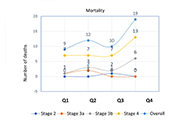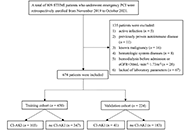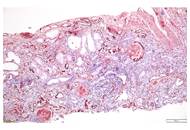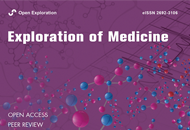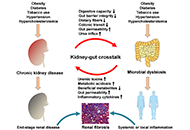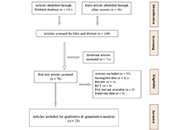
Disease Diagnosis, Molecular Mechanism and Therapeutic Strategies in Kidney Injury and Fibrosis
Guest Editor
Prof. Yingyong Zhao E-Mail
Professor, Faculty of Life Science & Medicine, Northwest University, Xi’an, China
About the Special lssue
Kidney disease and its complications are a major public health problem with increased morbidity and mortality worldwide. Patients with chronic kidney disease (CKD) are at increased risk for the development of cardiovascular disease (CVD) beyond traditional risk factors. The progression of CKD shows that patients reach end-stage renal disease and require renal replacement therapies such as hemodialysis, peritoneal dialysis and transplantation. Traditional clinical biomarkers of renal function (blood urea nitrogen and serum creatinine) are not sensitive or specific enough and only increase significantly after the presence of substantial CKD. Therefore, more sensitive biomarkers of CKD are needed. CKD-specific biomarkers at an early disease stage and early diagnosis of specific renal diseases would enable improved therapeutic treatment and reduced the personal and financial burdens.
Mounting studies have demonstrated the pathophysiological mechanism of CKD and its complications. Kidney damage is mediated by hypertension, diabetes mellitus, hypercholesterolemia, obesity, tobacco use and CKD-specific risk factors, including systemic disease, such as vascular calcification, atherosclerosis and immunological disorders. Recent findings indicate the impact of long non-coding RNA, gut microbiota, ageing and uremic toxins. A number of studies by both animal model and patients have demonstrated their effect on renal disease. The further studies should be performed in renal diseases. Angiotensin-converting enzyme inhibitors and angiotensin receptor blockers are identified as the first-line therapies that proved efficient to retard the progression of hypertension, CVD and CKD. Nevertheless, although this approach is undoubtedly effective, many CKD patients who are treated with these drugs progress to end-stage renal disease and require renal replacement therapies such as dialysis and transplantation.
This special issue is focusing on the discovery of novel biomarkers used in disease diagnosis and understanding the pathophysiology of CKD and its related systemic disease for developing new therapeutic strategies in renal disease. Both basic and clinical studies are welcomed in renal disease and its complications.
We invite investigators to contribute articles concerning the biomarker identification, disease diagnosis, pathological mechanism and therapeutic strategies in renal disease and its complications. The spectrum of coverage is broad, encompassing basic and clinical studies by using the methods of cellular and molecular biology, systems biology and meta-analysis. Potential topics include, but are not limited to:
Novel biomarker identification and discovery used disease diagnosis in renal disease and its complications by cellular and molecular biology and systems biology
The mechanism of cellular and molecular biology by basic research and clinical studies
Systems biology-based on the illumination of the pathogenesis of kidney disease
The long non-coding RNA, gut microbiota, ageing-associated physiological and pathological mechanism in renal disease
Basic and clinical research for assessing the efficacy and safety of drugs in renal disease
Methodological research such as meta-analysis, protocol of clinical trials in kidney disease
Keywords: Chronic kidney disease, acute kidney injury, cardiovascular disease, hypertension, diabetes, long non-coding RNA, gut microbiota, ageing, uremic toxins, biological activity, medical use, pharmacological interactions
Published Articles
